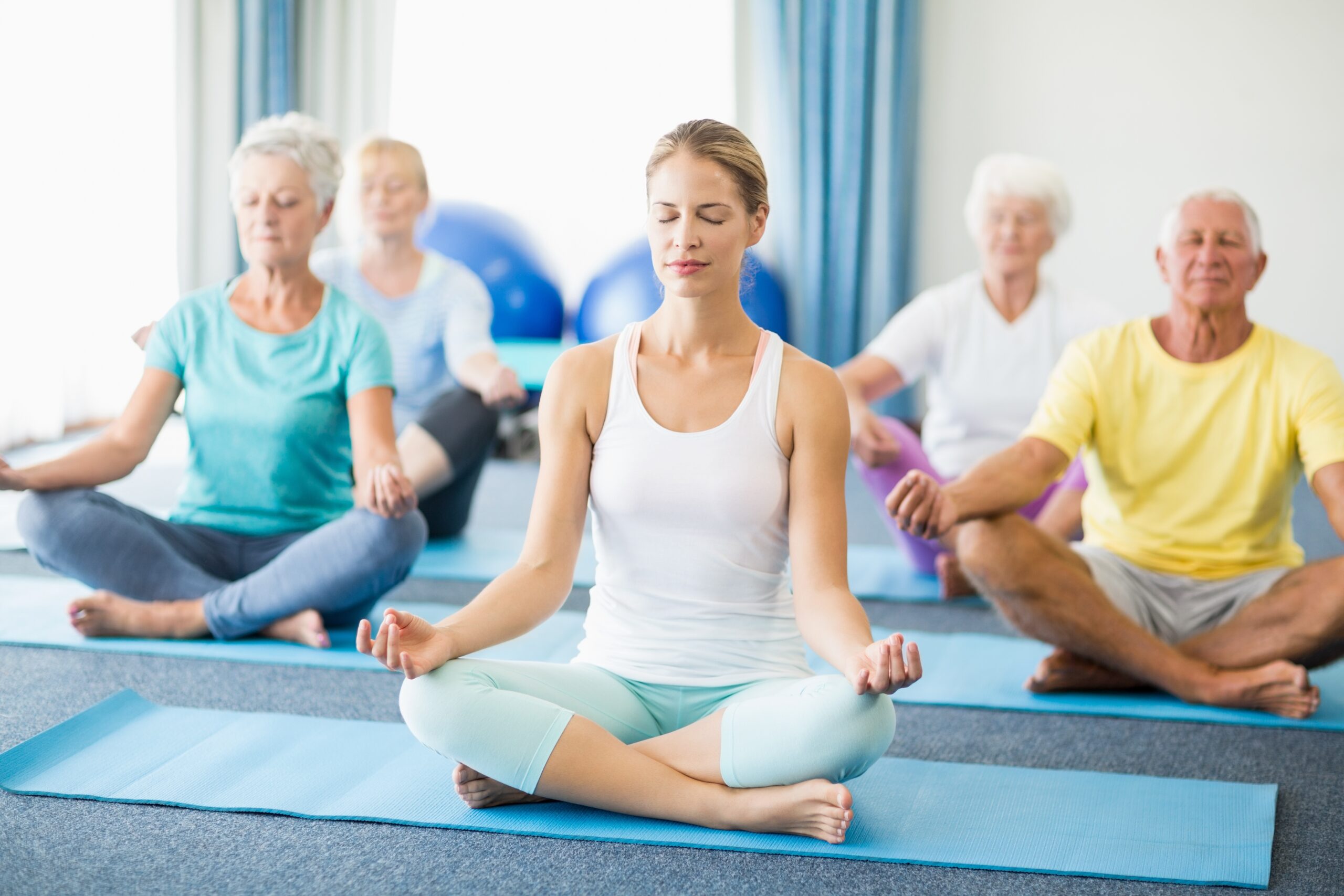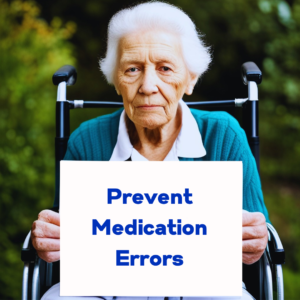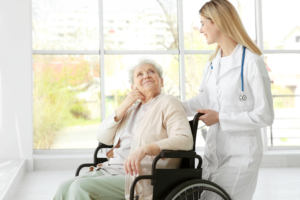As we age, our physical and mental health becomes just as important, if not more, than it was in our younger years. Maintaining good mental health is especially important for older adults who want to maintain their independence and quality of life. Many people tend to focus on physical wellness when thinking about aging, but the mind-body connection is equally important for healthy aging. In this blog post, we will explore the powerful tool of mindfulness and how it can benefit individuals at any age, especially those looking to maintain their independence as they age.
As we wrap up Heathy Aging Month, we wanted to touch on the mental health aspect. We will dive more deeply into this topic next month when we look at the What Matters Most concept called the 4 Ms. What Matters Most, Mobility, Mindfulness/Mental Health/Cognitive, and Medications. Don’t forget if you enjoy articles like this and want to be up to date on all things Healthy Aging, consider our free weekly email newsletter called Senior Saturdays.” You can sign up for free HERE.
Research has identified various benefits of mindfulness for mental and physical health, including reducing stress and anxiety, improving emotional regulation, and boosting cognitive function. As we age, our cognitive function may decline due to factors such as dementia or Alzheimer’s disease, and it is crucial to engage in activities such as mindfulness to help maintain cognitive function for as long as possible. Mindfulness practices can help reduce the risk of cognitive decline by improving attention control, memory, and executive functioning. (The higher level of mental functioning that is required to plan and carry out tasks needed in everyday life.)
Mindfulness can also help alleviate depression in seniors who often experience social isolation and health problems, which increases the risk of developing depression. Depressive symptoms such as fatigue and lack of motivation are often seen as a common aspect of aging, but mindfulness practices can reduce these symptoms and improve overall well-being.

1. What is mindfulness?
Mindfulness is a state of mind where you are fully present and engaged in the present moment, without judgment or distraction. It is a way of paying attention to your thoughts, feelings, and surroundings with openness and curiosity. Mindfulness practices are rooted in Eastern traditions but have gained popularity in Western society in recent years. Some popular mindfulness practices include meditation, deep breathing exercises, and yoga.
Mindfulness is the practice of being fully present and focused on the present moment. It involves paying attention to our thoughts, feelings, and sensations in our body without judgment. Mindfulness helps us become more aware of our patterns of thinking, emotions, and behaviors, which can help us make better choices in our lives.
Mindfulness is a powerful tool that everyone can benefit from, regardless of age. As we continue to age, our mental health becomes just as vital as our physical health, and we must pay attention to both. Incorporating mindful practices into our daily routines can improve cognitive function, reduce stress, and alleviate depressive symptoms. Mindfulness exercises such as deep breathing, body scans, yoga, chair yoga, and tai chi are great ways to improve physical health and mental well-being. Join us on our journey towards healthy aging by exploring the benefits of mindfulness and start integrating mindfulness practices into your daily routine today.
2. How can mindfulness benefit mental health?
Research has shown that mindfulness can reduce stress and anxiety, increase feelings of calm and relaxation, and enhance cognitive function. Mindfulness meditation has been specifically linked to increased gray matter in the brain, which is associated with memory, attention, and emotional regulation. Additionally, mindfulness practices can improve sleep quality, reduce symptoms of depression, and even lower blood pressure.
Mindfulness has been found to be an effective tool in reducing stress levels, which is associated with various health problems, including anxiety, depression, and cardiovascular diseases. Mindfulness practices such as meditation and deep breathing exercises have also been found to enhance cognitive function, memory, and attention. By incorporating mindfulness into our daily routine, we can maintain good mental health as we continue to age.
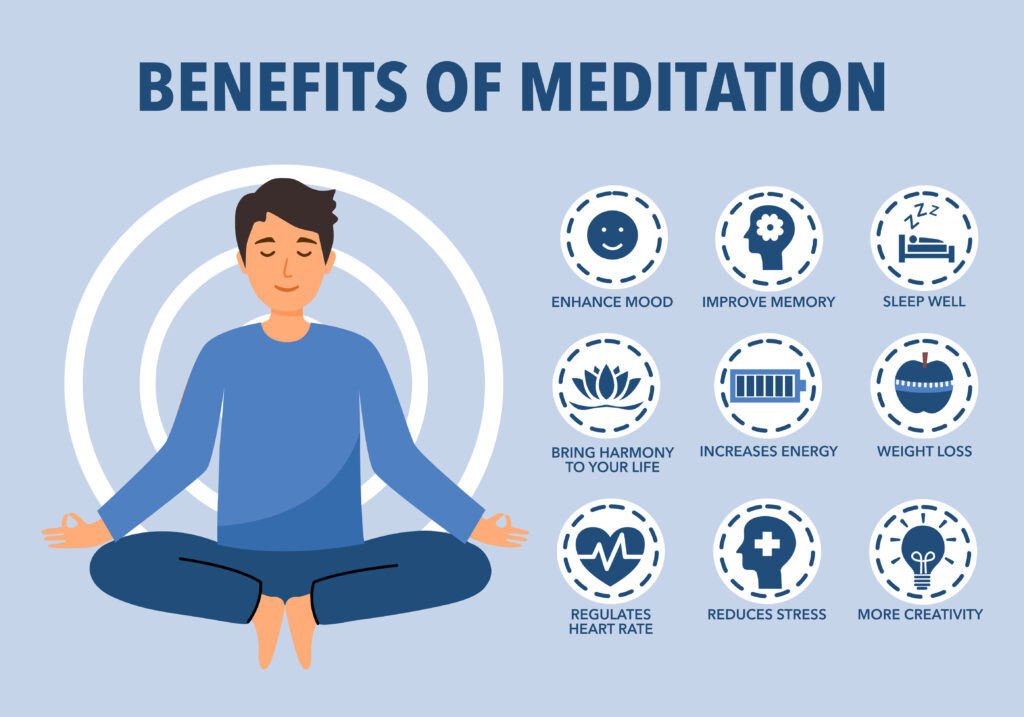
By Orapun Adobe Stock Photos
3. How can mindfulness help in healthy aging? How can older adults incorporate mindfulness into their daily routine?
There are many simple ways that older adults can incorporate mindfulness practices into their daily routine. Some ideas include taking a few deep breaths before getting out of bed in the morning, practicing yoga or tai chi, or even just taking a few minutes to sit quietly and focus on the present moment throughout the day. Another great option is guided meditation, which can be done through smartphone apps or online videos, and can range in length from just a few minutes to an hour or more.
There are various ways to practice mindfulness, including meditation, yoga, deep breathing exercises, and mindfulness-based stress reduction programs. Meditation involves sitting quietly and focusing on your breath or a particular object, while yoga combines physical poses and breathing exercises. Deep breathing exercises involve taking slow, deep breaths and paying attention to your breath as it moves in and out of your body. Mindfulness-based stress reduction programs combine meditation, yoga, and cognitive-behavioral therapy to reduce stress levels.
For those with COPD, Chronic Obstructive Pulmonary Disease or other chronic illnesses that effect your breathing, Mindfulness exercises are a great way to reduce the anxiety that goes along with your shortness of breath. The shortness of breath leads to more anxiety which leads to more shortness of breath and so the cycle gets going. Mindful breathing exercises can go along way in breaking that cycle and slowing down both your breathing and anxiety. You know your body, so don’t hesitate to seek medical attention if you need to. See the resources section below for more information and ideas.
4. How can mindfulness be a tool for maintaining independence as you age?
Many older adults face challenges related to declining physical health, which can be isolating and lead to feelings of anxiety or depression. Mindfulness can help to reduce stress and anxiety, which can improve overall well-being and quality of life. Additionally, practices like yoga, chair yoga, and tai chi can improve physical balance and flexibility, which can reduce falls and improve mobility. By incorporating mindfulness into their daily routine, older adults can improve their mental and physical well-being, which can increase feelings of independence and control over their own lives.
Incorporating mindfulness practices into our daily routines is easier than it may sound. Mindful practices, such as deep breathing, meditation, and other mindful exercises, can improve physical health and reduce stress. In addition, mindfulness exercises such as body scans, which involve paying attention to sensations in each part of the body, can improve the awareness and appreciation of one’s body. Practicing mindfulness regularly also strengthens the capacity to regulate emotions and tackle challenges.
Physical activity is essential for healthy aging, and mindfulness practices such as tai chi incorporate physical activity and mindfulness in one practice. Tai chi is a Chinese martial art that emphasizes slow, relaxed movements, and deep breathing, which can be a great way to improve physical health and mental well-being.
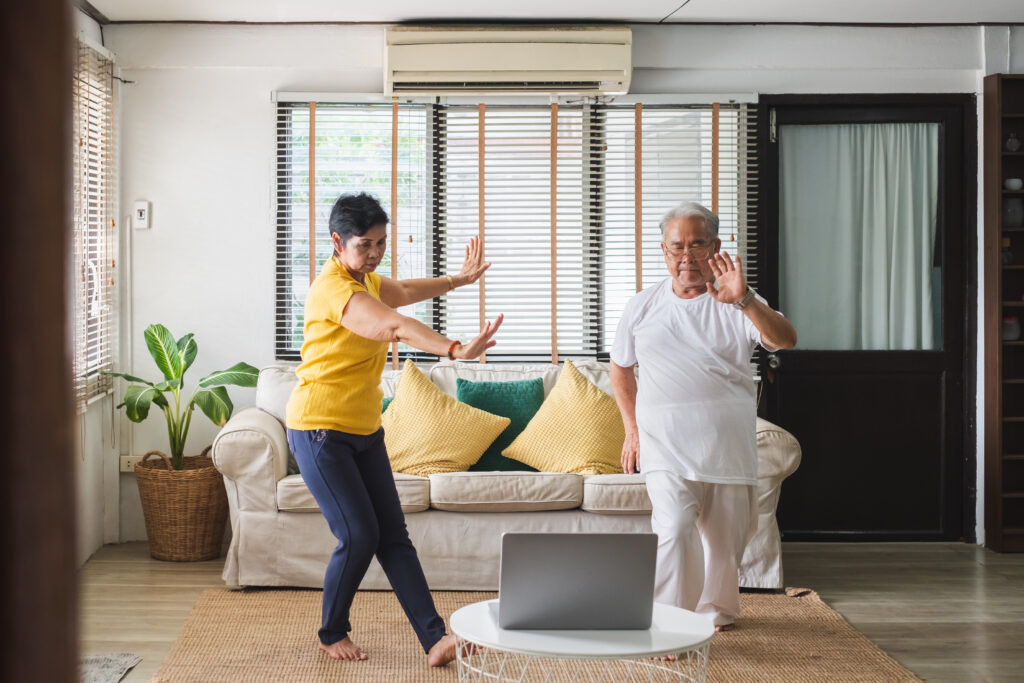
5. How can you learn more about mindfulness and healthy aging?
Stay tuned for our next blog post, where we will be exploring the 4 M Healthy Aging Initiative, including M-Mentation/Mental Health/Cognition. This initiative focuses on the four main domains of healthy aging: mobility, mentation, medications, and what matters most. By prioritizing these domains, older adults can maintain their health and independence, and enjoy a high quality of life well into their later years.
We will provide some resources at the end of this blog post to help guide you with more ideas in building your mindfulness practice.
Conclusion:
In conclusion, maintaining good mental health is just as important as physical health as we continue to age. Mindfulness is a powerful tool that can help us reduce stress levels, enhance cognitive function, and maintain a positive outlook on life. Incorporating mindfulness practices such as meditation, yoga, deep breathing exercises, and mindfulness-based stress reduction programs into our daily routine can help us maintain our mental health and promote healthy aging. Join us on our journey towards healthy aging by exploring the 4 M Healthy Aging Initiative, where we will break down each of the 4 Ms and take a closer look. Start your journey towards a happier, healthier life today!
Thanks for taking the time to stop by today and spend a few minutes with us. We look forward to seeing you back here soon!
Pam and Linda,
Your Nurse Advocates
“Compassionate care for aging adults, peace of mind for adult children.”
Resources:
Sign up for Your Nurse Advocates Free Weekly Newsletter, “Senior Saturdays”
Website: Your Nurse Advocate Consulting
https://www.nia.nih.gov/health/what-do-we-know-about-healthy-aging
https://www.nia.nih.gov/news/adopting-healthy-habits-what-do-we-know-about-science-behavior-change
https://www.nia.nih.gov/health/cognitive-health-and-older-adults
https://www.psychologytoday.com/us/blog/aging-and-mindfulness/202212/aging-and-mindfulness https://www.lung.org/blog/yoga-tai-chi-and-your-lungs

